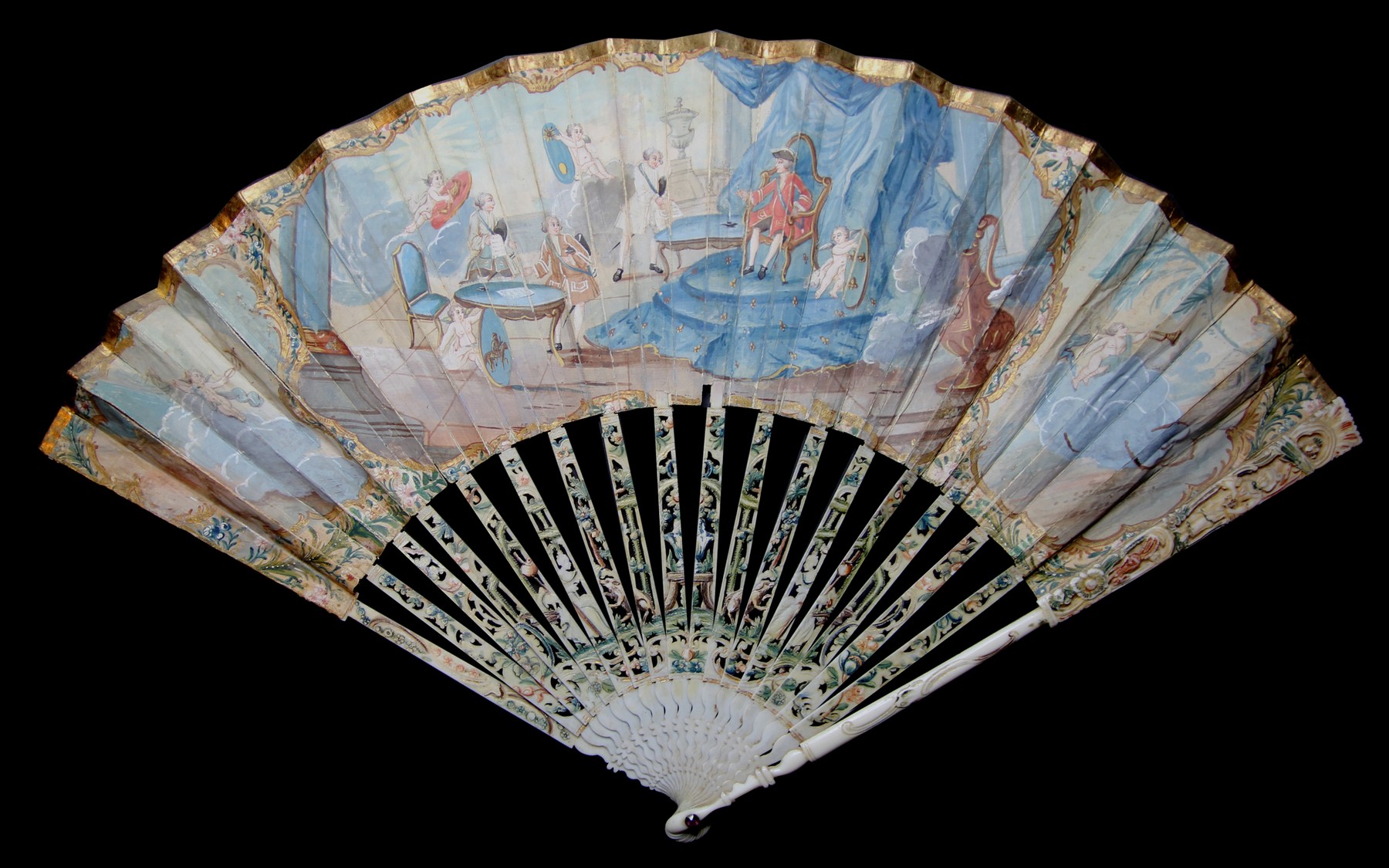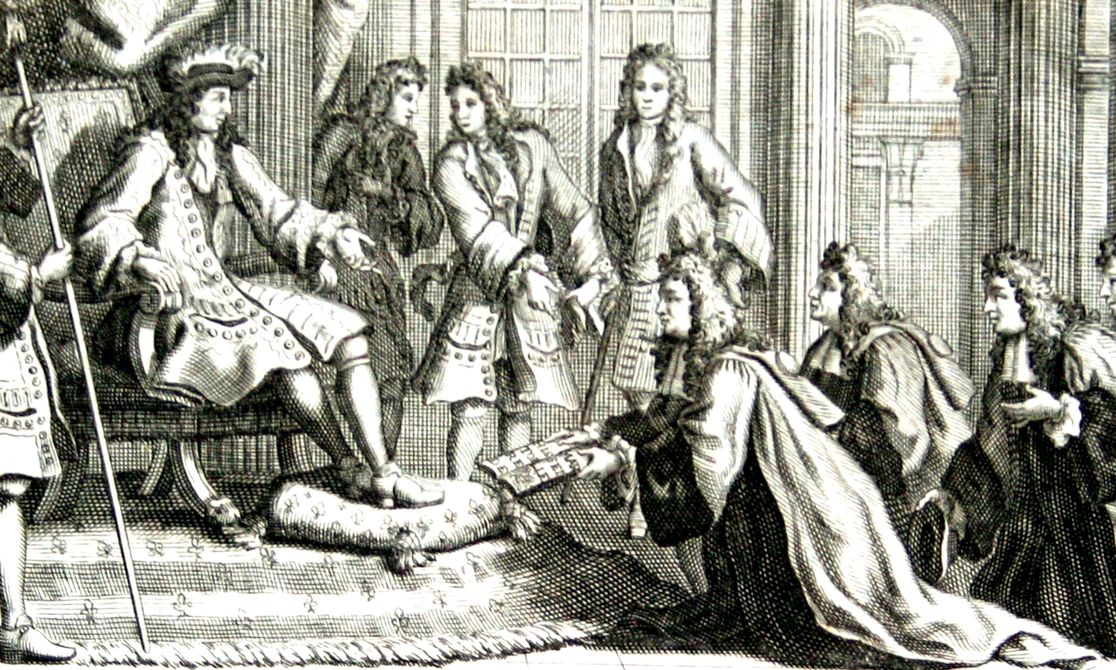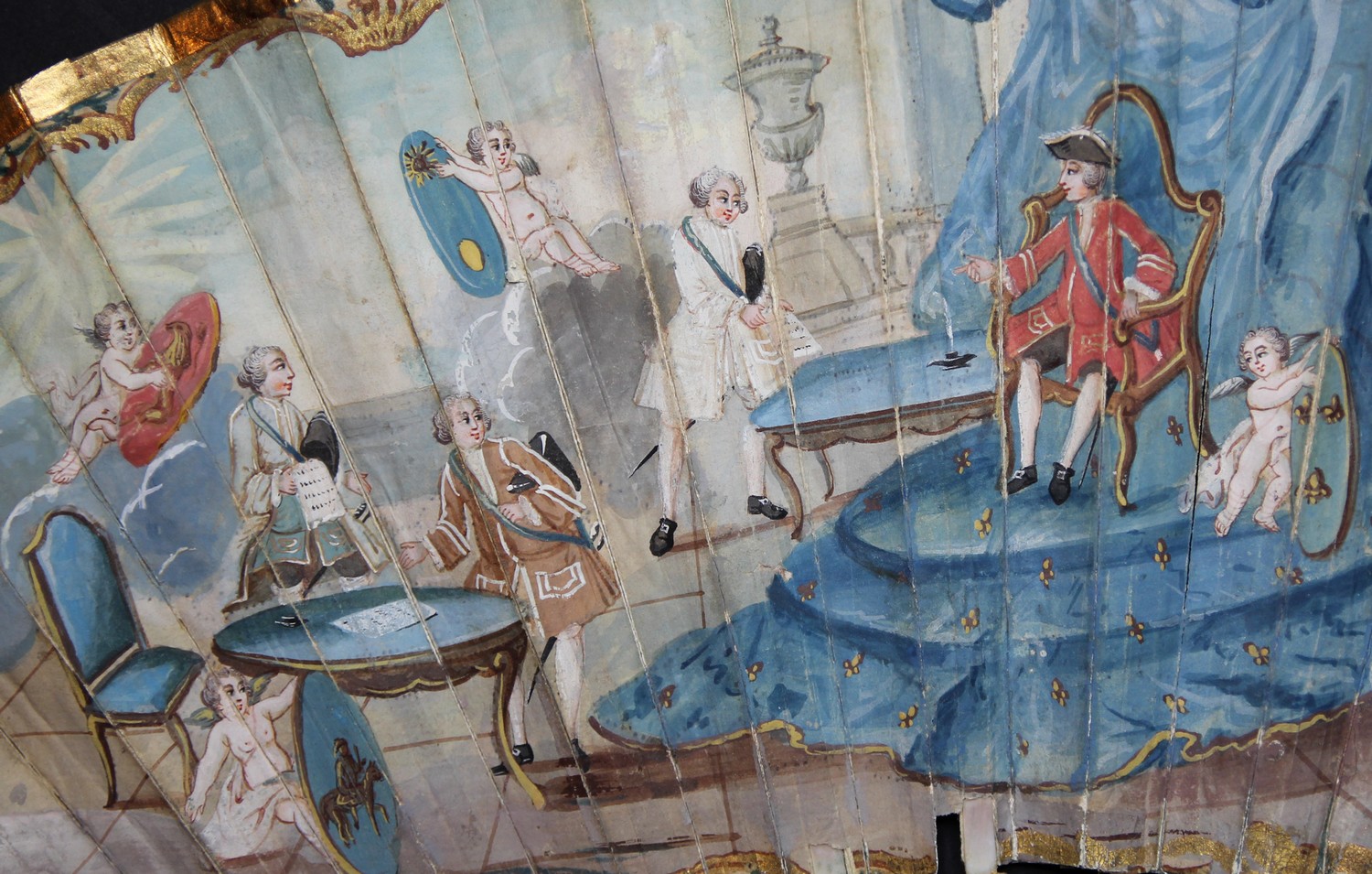We sometimes
show you here fans which have shared our life for years, the
questions concerning them having surfaced little by little. But here is
a recent acquisition, which we could not resist because we wanted to
answer the questions obviously asked by this fan. And also because, for
once, the object was for sale near from our home. It is a manifestly
French fan by all its characteristics. The total height is (no
surprise!) 27 cm and the leaf is 12.5 cm wide. The double leaf is for
us in laid paper (but the auctioneer has seen some parchment) painted
in light gouache and gilded. A quite wide golden border may have been
added later. The "monture squelette"
is ivory : pierced, engraved, decorated with varnish and gold. It shows
in the middle of floral motifs and in symmetry, aside a large vase of
flowers placed on a table, two young women with crooks and caressing
two dogs. The identical guards are adorned by a female character,
flowers and foliage. The rivet is adorned with two faceted red stones.
The fan is unfortunately not in perfect condition. A stick is broken,
fragile folds were more or less well restored. The object was obviously
kept open too long,. Happily it was protected from dust and too bright light,
for its colors are not faded. All these characteristics testify in fact
to the interest that its owners have brought to the object. So we guess
it had for them a precise meaning.

This kind of view is not unusual. Let us give two examples, with (beneath left) King Louis XIV being given the History of Marseilles by the town counsellers (A. de Ruffi, Histoire de la ville de Marseille, 1696) or (beneath right) M. de Mongeron standing presenting with his book King Louis XV sitting on his throne (BnF, Estampes et photographie, RESERVE QB-201 (95)-FOL )
 
The questions that this fan asks, and which led us to
take an interest in it, are in his decor. If the verso is adorned with
the very common landscape with small house, the recto is more original.
In the center, behind a large firepot, on a podium covered with a blue
veil dotted with fleurs-de-lys (forming canopy and carpet as well) ,
a man wearing a red garment, the sword held by a blue ribbon, sits on a
Louis XV high-backed armchair, the left hand on an armrest, right
stretched to designate something. On a nearby table is an inkwell with
a quill pen, which in the context seems logical. But would not it be
rather a smoking lamp, or an incense-burner? At the foot of the
platform, near another round table and a chair, three men (sword and
blue ribbon, hat under the arm) handle handwritten sheets. Behind the
four men, putti present oval shields: weapons of France behind
the king, gold cavalier (the horse trippant) on a background of azure,
golden eagle on gules, sun and moon (?) of gold on azure. On the left,
a putto holds a winged anchor in front of a ship. On the right another
putto blows a trumpet of Fame. The anchor and the ship lead us to think
that one or more of those men is a seaman, or deals with navigation or
international trade. The fame may be anterior to the fact recalled by
the fan, or a consequence of it.

Without a doubt, this fan refers to a specific event, or a situation
that it symbolizes. I have asked Dr. Aurore Chéry, excellent
connoisseur of the French royal family in the eighteenth century. She
too thinks it could be the signing of a treaty or an agreement between
the king and the people represented on thefan. Identifying the coats of
arms would surely help a lot. It is easy to recognize the arms of
France thanks to the fleurs de lys that dot the blue drapery serving as
both canopy, tapestry and carpets. The man in red can only be the king
of France. He seems young if he is Louis XV, born in 1710. But the portrait made in 1773 by François-Hubert Drouais, one year before the death of the king, does not show an old man ...
But, alas, we can not identify the other coats of arms. For
the golden eagle on gules, could be from Constantinople, or
even (if we admit that our eagle is bicéphale), with the
Cantacuzène family who in the eventful history of the distant Moldavia and
Wallachia gave some sovereigns . Likewise, a blazon of azure with a sun and a silver moon crescent could evoke Transsylvania. But here the moon (?) is full and looks golden. Besides, what would these nobles from Ottoman confines do here, and in a so little Oriental dress? Beside Louis XV, we would have preferred that the eagle was silver, which would have led us to Poland (his wife origin). Certainly we find families, like the Astevants in Provence, who care so emblazoned. All nobility depend on the king, one way or another. Yet
for the moment we have not found any family sporting on its coat of
arms a golden trippant horseman on a background of azure. Certainly,
we have noted that Antoine de Pluvinel, born in Dauphiné, (who
set up an equestrian academy in Paris and was ennobled by Charles IX),
had taken for arms: Azure with a golden cavalier holding a silver
sword. But the horse seems to be prancing. And,
even if the Pluvinels have made alliances up to Montenegro, what would be the
link between those three families, if they are families?
So let us confess our distress. And we surely will not come to the truth on the back of the fan!
That is why I count on you, friends, followers, visitors to this Place de l'Eventail. Can you help me find the solution to this problem? Or simply, by some suggestion, give me new ideas?
Thankyou for your answers. ( Please email through our home page). Go and have alook at our other
questions! Strollon this Place de l'Eventail !
|
